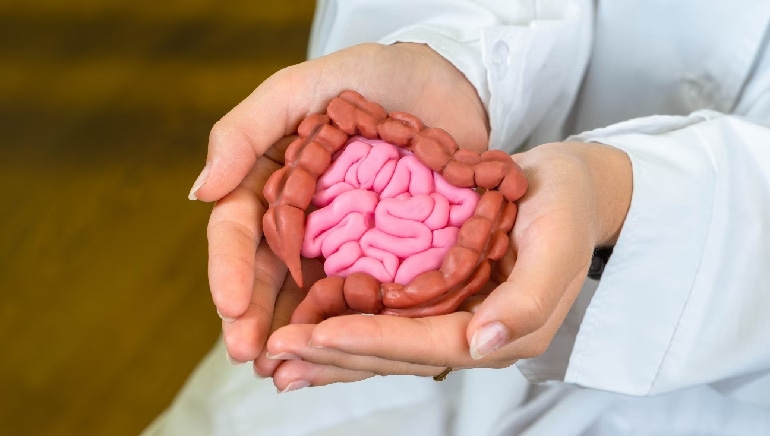
Lifestyle control to improve gut health has many very simple solutions - Photo: Healthshots
According to the Independent , a new study has found that nearly two-thirds of people (65%) surveyed are unaware of how important gut health is to their overall health and wellbeing.
British nutritionist Jo Travers stressed: "There is a significant knowledge gap in understanding that gut health can improve overall health. Lifestyle management to improve gut health has many very simple solutions, involving adjustments to our daily habits."
Eat more plants good for the gut
Eating a variety of plant-based foods, such as fruits, vegetables, whole grains, and legumes, feeds the beneficial bacteria in your gut, Travers says. The more plants you eat, the more diverse your gut bacteria are, which can have a positive impact on sleep and stress reduction.
She suggests trying to consume 30 different plant-based foods each week, pointing out that different colors of the same vegetable, such as red, yellow or green bell peppers, all count toward the 30 weekly total.
Increase physical activity
Exercise is essential for overall health, and even light activity like walking can boost immune function, promote gut microbiome diversity, and help stimulate bowel movements, supporting good digestion, Travers says.
Stay hydrated
Travers suggests trying to drink six to eight glasses of water a day. “Never underestimate the importance of staying hydrated,” she says. “Water will improve almost every process in your body, including digestion, energy levels, and the quality of your sleep.”
Stress Control
Although the survey found that 86% of respondents believe stress can contribute to poor gut health, less than one in five (16%) actively seek to manage stress.
Travers explains that stress triggers the production of the stress hormone cortisol, which is thought to disrupt the communication pathways between the gut and the brain. This can affect blood flow and intestinal secretions, potentially feeding harmful bacteria and hindering the growth of beneficial bacteria.
“While we can’t always control what happens in our lives, we can choose how we respond to stressful situations by learning stress management techniques like deep breathing, meditation, and mindfulness to reduce the impact on our bodies and help our gut microbiome recover better,” she says.
Prioritize sleep
A good night's sleep can have a positive impact on gut health, but the survey found that less than half (45%) of respondents prioritised getting at least seven hours of sleep each night.
"Many people stay up late, but it's important to remember that beneficial gut bacteria thrive on a well-rested body, seven to nine hours," Travers notes.
She suggests avoiding screen time before bed, reading instead, and making sure the bedroom is dark and cool.
Eat fermented foods
Travers says fermented foods can support gut health by promoting the growth of beneficial bacteria. She says adding fermented foods to your diet is easier than people think. Dairy products that contain live bacteria include yogurt, sour cream, and most cheeses.
However, she cautions that fermented foods like some sauerkraut and kimchi products made with vinegar or pasteurized may not contain live bacteria. The same goes for pasteurized cheeses, so always check the label.
Walking with a dog
Your environment can also influence your gut health. Animals, plants, soil, and green spaces all have their own beneficial microbiota.
“Being in nature can also foster a healthy gut. If you have a pet, cuddling, walking in the park, or gardening will increase your exposure to these beneficial bacteria and improve your gut microbiome and health,” she says.
Source: https://tuoitre.vn/7-cach-giup-ban-tang-cuong-suc-khoe-duong-ruot-20240918233028534.htm


![[Photo] Comrade Khamtay Siphandone - a leader who contributed to fostering Vietnam-Laos relations](https://vstatic.vietnam.vn/vietnam/resource/IMAGE/2025/4/3/3d83ed2d26e2426fabd41862661dfff2)

![[Photo] General Secretary To Lam receives Russian Ambassador to Vietnam](https://vstatic.vietnam.vn/vietnam/resource/IMAGE/2025/4/2/b486192404d54058b15165174ea36c4e)
![[Photo] Prime Minister Pham Minh Chinh receives CEO of Standard Chartered Group](https://vstatic.vietnam.vn/vietnam/resource/IMAGE/2025/4/2/125507ba412d4ebfb091fa7ddb936b3b)

![[Photo] Prime Minister Pham Minh Chinh receives Deputy Prime Minister of the Republic of Belarus Anatoly Sivak](https://vstatic.vietnam.vn/vietnam/resource/IMAGE/2025/4/2/79cdb685820a45868602e2fa576977a0)


























































































Comment (0)